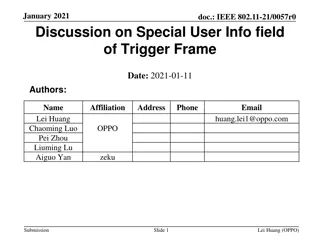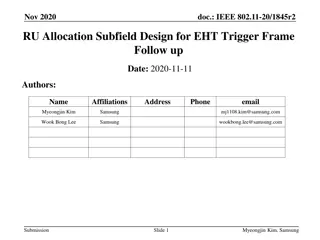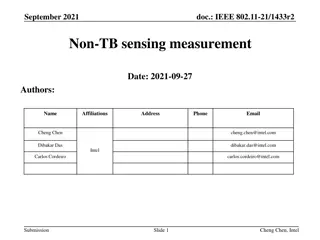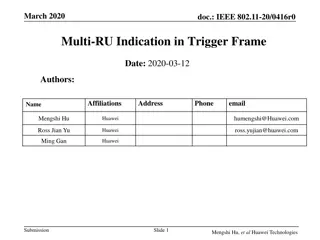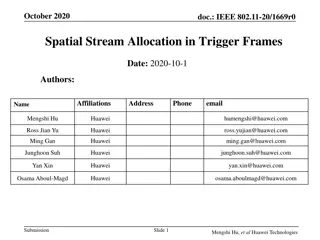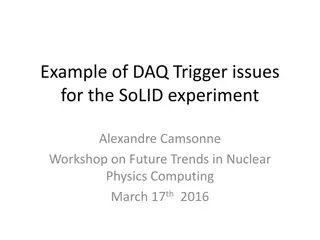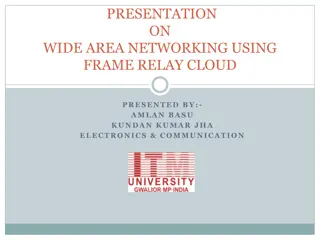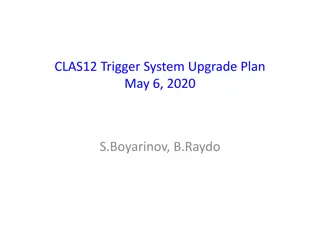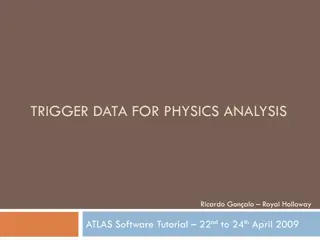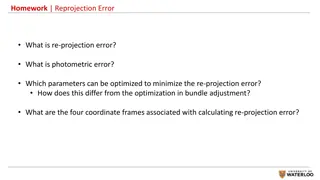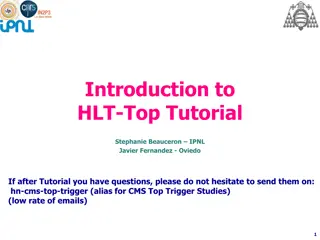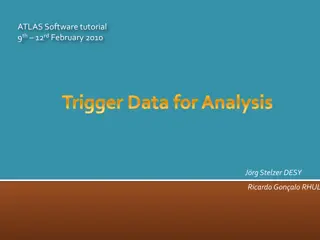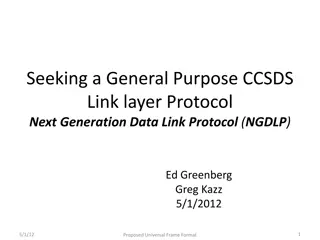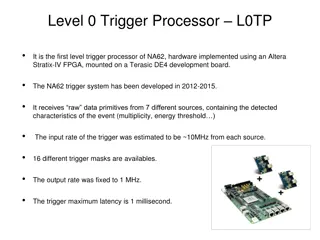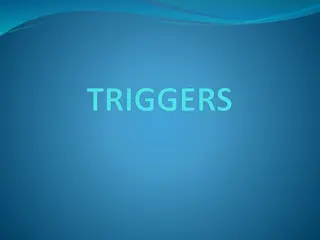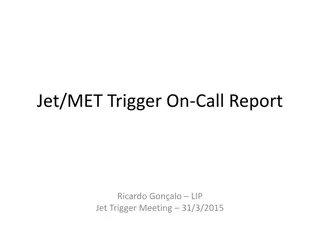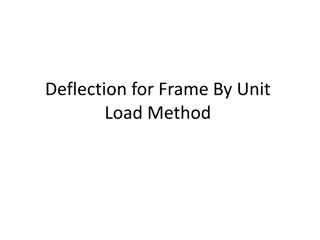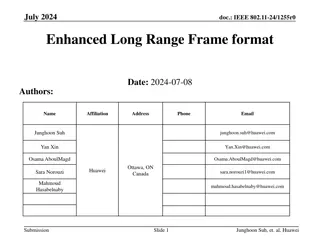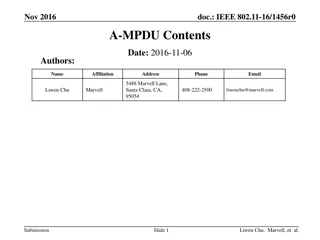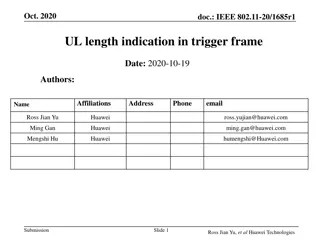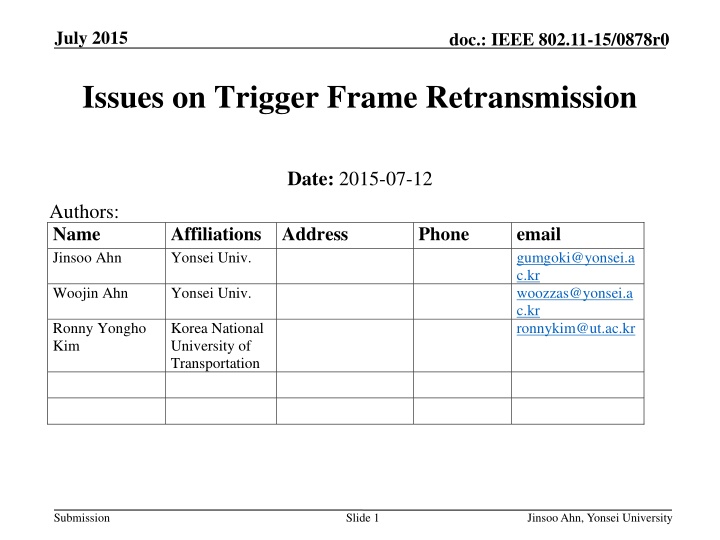
IEEE 802.11-15/0878r0 Trigger Frame Retransmission Issues
This document discusses the issues related to trigger frame retransmission in IEEE 802.11-15/0878r0, focusing on the UL-OFDMA procedure and the implications of trigger frame failures. It covers topics such as acknowledgement mechanisms, access schemes, EDCA procedures, and retransmission scenarios. The content emphasizes the importance of defining parameters like AIFS and CW for trigger frames to ensure successful exchanges in dense environments.
Download Presentation

Please find below an Image/Link to download the presentation.
The content on the website is provided AS IS for your information and personal use only. It may not be sold, licensed, or shared on other websites without obtaining consent from the author. If you encounter any issues during the download, it is possible that the publisher has removed the file from their server.
You are allowed to download the files provided on this website for personal or commercial use, subject to the condition that they are used lawfully. All files are the property of their respective owners.
The content on the website is provided AS IS for your information and personal use only. It may not be sold, licensed, or shared on other websites without obtaining consent from the author.
E N D
Presentation Transcript
July 2015 doc.: IEEE 802.11-15/0878r0 Issues on Trigger Frame Retransmission Date: 2015-07-12 Authors: Name Jinsoo Ahn Affiliations Address Yonsei Univ. Phone email gumgoki@yonsei.a c.kr woozzas@yonsei.a c.kr ronnykim@ut.ac.kr Woojin Ahn Yonsei Univ. Ronny Yongho Kim Korea National University of Transportation Submission Slide 1 JinsooAhn, Yonsei University
July 2015 doc.: IEEE 802.11-15/0878r0 Introduction UL-OFDMA and UL-MU-MIMO are key enabling technologies to enhance the performance in dense environment in 11ax Trigger Frame was adopted in SFD to initiate UL-OFDMA transmission[1] The acknowledgement of Trigger Frame was discussed in the last meeting[2] UL MPDU/A-MPDU could be the acknowledgement of the trigger frame Submission Slide 2 JinsooAhn, Yonsei University
July 2015 doc.: IEEE 802.11-15/0878r0 Trigger Frame based UL-OFDMA procedure BA 5 STA2 DL PPDU Trigger Frame M- BA STA1 UL PPDU STA2 UL PPDU BA 2 STA3 UL PPDU STA5 UL PPDU Trigger frame could be transmitted with contention based access scheme (similar to RTS frame) UL PPDU could be the acknowledgement of trigger frame M-BA is the acknowledgement of UL PPDUs Conventional EDCA procedure follows UL OFDMA transmission Submission Slide 3 JinsooAhn, Yonsei University
July 2015 doc.: IEEE 802.11-15/0878r0 Trigger Frame based UL-OFDMA procedure What kind of CW is applied? Trigger Frame What kind of procedure follows Trigger Frame failure? What kind of AIFS is applied? No Response No Response No Response Access Category(AC) of Trigger frame should be defined To determine Trigger Frame s AIFS, CW, etc. Not only fixed values but also variable values could be considered Absence of some or all UL PPDUs after Trigger Frame might mean a failure of trigger frame exchange At least, absence of all UL PPDUs after trigger frame means a failure of trigger frame exchange What is the next procedure of the trigger frame failure? Submission Slide 4 JinsooAhn, Yonsei University
July 2015 doc.: IEEE 802.11-15/0878r0 Retransmission of Trigger Frame Conventional retransmission of trigger frame AP considers the transmission failed and retransmits Trigger Frame Retransmitted Trigger Frame AP will contend with other stations Longer CW is applied due to tx failure BA 2 Trigger Frame Trigger Frame M- BA No Response STA 1 UL PPDU EIFS No Response No Response No Response STA2 UL PPDU STA 3 UL PPDU STA2 already transmitted its UL PPDU before UL OFDMA Due to large retransmission delay, original UL OFDMA scheduling might be invalid UL STA could transmit its PPDU before TF retransmission Channel availability could be changed Submission Slide 5 JinsooAhn, Yonsei University
July 2015 doc.: IEEE 802.11-15/0878r0 Retransmission of Trigger Frame Conventional retransmission of trigger frame Trigger frame retransmission with conventional contention based retransmission could degrade 11ax system performance due to invalidity of UL OFDMA scheduling We need to consider other type of retransmission procedure in case of trigger frame failure Criteria for retransmission Contention based retransmission or not Behavior of AP after retransmission failure Submission Slide 6 JinsooAhn, Yonsei University
July 2015 doc.: IEEE 802.11-15/0878r0 Retransmission of Trigger Frame Fast retransmission of Trigger Frame AP considers the transmission failed and retransmits Trigger Frame immediately AP will contend with other stations with initial CW BA 5 Trigger Frame Trigger Frame M- BA No STA 1 UL PPDU Response No STA 2 UL PPDU Response No STA 3 UL PPDU STA5 UL PPDU Response Preamble Duration Original TXOP AP retransmits its trigger frame after sensing absence of UL-PPDU(s) If AP cannot detect UL OFDMA PPDU and the channel is idle, AP immediately retransmit its trigger frame Retransmission number or duration might be limited Submission Slide 7 JinsooAhn, Yonsei University
July 2015 doc.: IEEE 802.11-15/0878r0 Retransmission of Trigger Frame Fast retransmission of Trigger Frame In fast retransmission scheme, conventional retransmission scheme on trigger frame is not allowed Fast retransmission could sustain its reliability on UL OFDMA scheduling Original TXOP is not accessible in conventional 802.11 system AP get TXOP only if Downlink PPDU transmission and cannot detect collision Therefore, fast retransmission may not cause severe interferences than conventional 802.11 Submission Slide 8 JinsooAhn, Yonsei University
July 2015 doc.: IEEE 802.11-15/0878r0 Fast retransmission failure Initial CW for next frame AP considers the transmission failed and retransmits Trigger Frame immediately AP will contend with other stations with initial CW BA 5 Trigger Frame Trigger Frame Trigger Frame M- BA No No STA 1 UL PPDU Response Response No No STA 3 UL PPDU Response Response No No STA2 UL PPDU STA 4 UL PPDU Response Response Preamble Duration Preamble Duration Fast Retransmission Failure would delete Trigger Frame in Buffer Retransmission duration AP could transmit a next frame after fast retransmission failure The next frame could be a new trigger frame or DL data frame(s) Initial CW is applied to next frame because CW doubling is applied only on retransmission in conventional 802.11 system Submission Slide 9 JinsooAhn, Yonsei University
July 2015 doc.: IEEE 802.11-15/0878r0 Fast retransmission failure Doubled CW for next frame AP considers the transmission failed and retransmits Trigger Frame immediately AP will contend with other stations with doubled CW BA 2 Trigger Frame Trigger Frame Trigger Frame M- BA No No STA 1 UL PPDU Response Response No No STA 3 UL PPDU Response Response No No STA2 UL PPDU STA 4 UL PPDU Response Response Preamble Duration Preamble Duration Fast Retransmission Failure would delete Trigger Frame in Buffer Retransmission duration Although conventional retransmission rule is not applied to trigger frame, trigger frame failure could be considered as congestion situation To avoid congestion, CW doubling could be applied upon trigger frame failure Doubled CW is applied to the next frame Submission Slide 10 JinsooAhn, Yonsei University
July 2015 doc.: IEEE 802.11-15/0878r0 Conclusion We need to discuss access category parameters of trigger frame Next procedure of trigger frame failure need to be defined Conventional retransmission has some problems(issues) on trigger frame Fast retransmission could be considered instead of conventional retransmission Submission Slide 11 JinsooAhn, Yonsei University
July 2015 doc.: IEEE 802.11-15/0878r0 Straw Poll Do you agree with trigger frame is not allowed to follow conventional retransmission procedure? Y N A Submission Slide 12 JinsooAhn, Yonsei University
July 2015 doc.: IEEE 802.11-15/0878r0 References [1] IEEE 802.11-15/0132r4 "Specification Framework for TGax" [2] IEEE 802.11-15/0615r1 UL OFDMA Bandwidth" Submission Slide 13 JinsooAhn, Yonsei University

